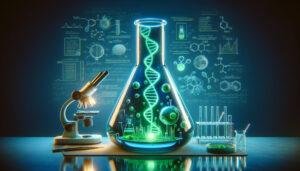In the latest episode of “The Struggling Scientists,” Suzanne and Jayron sit down with Assistant Professor Francesca Grisoni, an expert in AI-driven drug discovery. Throughout the episode, Francesca sheds light on the role of machine learning in accelerating the search for potential drug molecules. She shares her personal journey, the advancements in deep learning, limitations of AI in this field, and the integration of AI into traditional drug discovery pipelines.
The Power of Machine Learning in Drug Discovery:
Francesca begins by explaining how machine learning, a branch of AI, is revolutionizing the process of finding molecules that interact with disease targets. With an enormous search space of molecules, up to 10^60, drug discovery can be an overwhelming task.
However, machine learning algorithms learn from data without explicit programming, allowing researchers to expedite the search process. These algorithms screen libraries, suggest novel molecules, and help identify starting points for drug discovery.
Francesca's Journey from Environmental Science to Drug Discovery:
Francesca’s background in environmental sciences led her to develop a passion for interdisciplinary research. During her PhD, she delved into using machine learning to predict molecular properties for toxicology, aiming to replace animal testing. This experience fueled her interest in computer-assisted drug discovery, and she realized the potential of applying similar methods to finding cures for diseases. Now an assistant professor, she leads an interdisciplinary team in using AI tools for drug discovery.
The Changing Landscape of Technology and Deep Learning:
Francesca highlights the significant changes in technology, particularly with the advent of deep learning. Deep learning, based on neural networks, captures complex and nonlinear information in data, surpassing previous approaches in many tasks.
Natural language processing-inspired deep learning methods have been successful in designing new molecules. However, she discusses how complex deep learning approaches may not always outperform simpler methods in predicting molecule activity.
The Collaboration between Experimental Scientists and AI:
Francesca stresses an increasing openness among experimental scientists towards AI, recognizing its potential for accelerating drug discovery. This growing cross-domain collaboration is bridging the gaps between chemistry, biology, and computer science, facilitating scientific growth.
Staying up to date with the vast amount of literature can be challenging, but Francesca relies on platforms like Twitter and Mastodon for effective communication within the scientific community.
Limitations and Challenges in AI for Drug Discovery:
While AI has shown immense promise in drug discovery, Francesca acknowledges several limitations. Out-of-distribution generalization poses a significant challenge, as models trained on specific data distributions struggle to make predictions outside of that scope.
Additionally, models can exhibit overconfidence, leading to incorrect results when tested in the lab. Ongoing research focuses on developing explainable AI and data generation methods to address these limitations.
The Clever Hans Effect and Trusting AI Predictions:
Francesca introduces the Clever Hans effect, where AI models provide correct predictions but for the wrong reasons, relying on shortcuts in the data. Trusting predictions based on these shortcuts can be problematic, particularly when important decisions are at stake.
To mitigate this, careful data selection, bias checking, and the use of explainable AI approaches are crucial. Understanding how models learn and identifying shortcuts can help improve their trustworthiness.
AlphaFold: A Game-Changer in Protein Structure Prediction:
AlphaFold, a highly discussed topic in the field, has revolutionized protein structure prediction. By accurately predicting protein structures, AlphaFold contributes to understanding biology and disease mechanisms.
However, Francesca advises caution, as AlphaFold relies on curated datasets and computational resources. Limitations related to generalization and dynamic protein structures must be considered alongside the breakthroughs it offers.
Integrating AI into Traditional Drug Discovery Pipelines:
AI is progressively finding its place in drug discovery pipelines, with applications in startups, industry, and academia. Francesca emphasizes that there is no one-size-fits-all model due to the diverse ways molecular structures interact with targets and the varied tasks involved.
Foundational models can be built using existing data, allowing for fine-tuning with focused datasets. Overcoming the challenge of making reliable models with limited data is vital, alongside exploring ways to transfer knowledge from related problems.
The Future of AI in Drug Discovery:
Looking ahead, Francesca expresses optimism about the increasing popularity of active learning, where AI models choose which data to test, thus advancing their own learning and reaching goals more efficiently.
Encoding chemical information accurately for computers remains a limiting factor, signaling the need for innovative ways to capture and utilize this critical data. Continued collaboration, research, and improvement in these areas will drive the future of AI in drug discovery.
Conclusion:
Francesca Grisoni’s insights on the integration of machine learning and AI into drug discovery provide a glimpse into an exciting frontier of scientific exploration. As technological advancements and interdisciplinary collaborations reshape the landscape, the potential for AI to revolutionize drug discovery and accelerate the development of life-saving treatments grows exponentially. With ongoing research and improvements, the future of AI in drug discovery holds remarkable promise.
If you’d like to learn more about Francesca Grisoni and her work then you can follow her on LinkedIn and Twitter (X).




